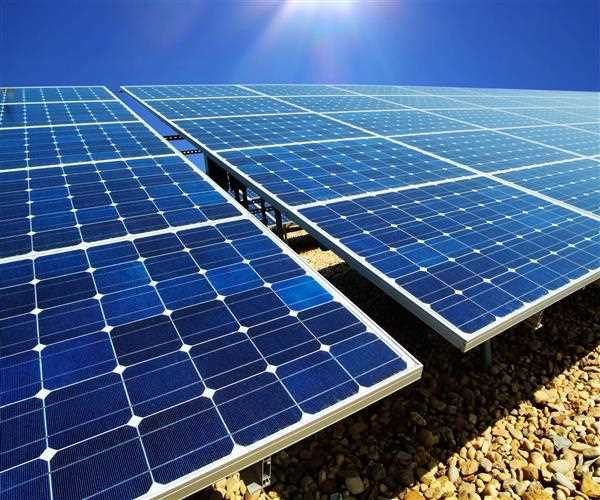Are you considering installing a solar panel system but unsure how much solar panels produce energy? Don't worry, we've got you covered. In this blog post, we'll teach you everything you need to know about calculating expected energy production from your solar panel system. With our step-by-step guide, you'll be able to determine the exact amount of clean and renewable energy your panels can generate. So sit back, relax, and let's dive in.
Introduction to Solar Panels
Solar panels are devices that convert sunlight into electricity. They are made up of photovoltaic (PV) cells, which are light-absorbing material that produces electricity from sunlight.
When photons from the sun hit a PV cell, they knock electrons loose from their atoms. Electrons flow through the material to metal contacts on the cell, generating an electric current. This current can then be used for electrical power equipment or to recharge batteries.
Solar panels come in a variety of sizes and shapes, and they can be used for a variety of applications, including powering homes and businesses, providing backup power during grid outages, and powering electric vehicles. Commercial and industrial applications can also use solar panels to generate hot water or steam.
How to Calculate the Expected Energy Production
Assuming you have already bought or leased a solar panel system, to calculate the expected energy production, you need to know the nameplate rating of your system in kilowatts (kW), the average daily sunlight hours in your area, and your system's average annual production by month.
To calculate your system's monthly average production, take the nameplate rating and multiply it by the number of peak sun hours for that month. So, this will give you the number of kWh that your system should produce in an ideal month. However, because no location is sunny all year long and solar panels aren't 100% efficient, you should expect actual production to be about 80% of the ideal. So take your monthly figure and multiply it by 0.8 to get a more realistic estimate.
Now that you know how much power to expect from your system. You can use this information to help offset your energy usage and save money on your electric bill.
Factors that Affect Solar Panel Efficiency
There are a few key factors that affect the efficiency of solar panels, and thus the amount of energy they produce. The panel installation angle is the first factor to consider. A shallow angle will limit their ability to capture sunlight and reduce their efficiency. So, the second factor is the amount of sun exposure they get. If the panels are in a shady area. They will not be able to capture as much sunlight and will be less efficient. The third factor is the temperature of the panel. So, if the panel is too hot, it will not be able to convert as much sunlight into electricity and will be less efficient.
To explore solar solutions tailored for Reno, Nevada, homeowners and businesses can utilize local expertise and resources to ensure their solar installations are optimized for the region's sunny climate. With a variety of options available, from residential rooftop panels to large-scale commercial projects, there's a sustainable energy solution to fit every need in the Silver State.
Understanding Your Solar Panel System Output
A solar panel system's output depends on several factors. Including its size, the amount of sunlight it receives, and its efficiency. To calculate your expected energy production. You'll need to know the rated capacity of your system in kilowatts (kW), and the average daily insolation in your area in kilowatt-hours per square meter (kWh/m2).
You can find the rated capacity of your system on your solar panel's specification sheet. Solar panels typically have capacities between 250 and 500 watts. This is called the "maximum power output" or the "nominal power." For instance, most residential solar panels generate around 250 watts at maximum power.
To find the average daily insolation in your area. You can consult a solar insolation map like this one from the National Renewable Energy Laboratory (NREL). So, simply find your location on the map and note the value in kWh/m2.
Once you have these two values, you can calculate your expected energy production using this formula:
Expected Energy Production (in kWh) = System Capacity (in kW) x Average Daily Insolation (in kWh/m2) x Panel Efficiency (%)
For example, let's say you have a 5 kW solar panel system with an average daily insolation of 4 kWh/m2 and panels with an efficiency of 15%. Using the formula above, we would calculate that this system would produce approximately 600 kWh per year:
Maintenance Tips for Optimal Performance
Assuming your solar panel system is installed correctly and you have the right equipment. So, here are some tips to help ensure optimal performance and avoid any issues:
- Regularly check and clean your panels to ensure they are free of dirt, dust, or debris.
- Keep an eye on your system's performance via an online monitoring portal. This will help you identify any potential issues early on.
- If you live in an area with heavy snowfall, make sure to clear your panels of any snow accumulation.
- Contact your solar installer or retailer if you notice anything unusual with your system's performance.
Conclusion
Calculating your expected solar panels to produce energy from a solar panel system is a great way to understand the potential of renewable energy and make the best decision when it comes to investing in one. In this article, we have discussed how you can calculate the expected energy output from your solar panel system, including factors such as location, size of your array, and orientation. We hope that this information has been useful and that you feel equipped with all the necessary knowledge for making an informed choice about which type of solar panel system will be most beneficial for you.




Leave Comment